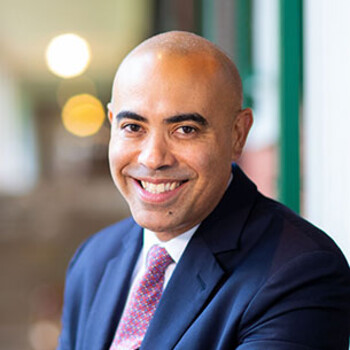
Ian Solomon’s career spans diplomacy, policy making, business, and higher education. A common thread across his experiences in more than 40 countries is a passion for leadership that brings people together.
“I consider myself to be a student of leadership,” said Solomon, now Dean of the University of Virginia’s Frank Batten School of Leadership and Public Policy. “I believe we are all always learning, and we can use every single interaction — successful interactions as well as every failure and disappointment — as a window to greater wisdom and growth.”
As Dean, Solomon leads a multidisciplinary faculty of scholars and practitioners at a school committed to developing the type of policy leaders that the world needs right now: ethical, passionate, empathetic, curious, humble, committed to serving the greater good. Fittingly, Solomon sums up his leadership journey in one word: “Ongoing.”
Over the course of his career, he has dedicated himself to improving the lives of people across the globe, using his expertise in negotiation and conflict resolution and an understanding of social structures. He traces his interest in the latter to his time at Yale Law School.
“My time at YLS cultivated a profound curiosity in how systems of social organization work (or fail to work) in shaping the quality of our lives,” said Solomon. “It also reinforced for me the opportunity that each person has in shaping these same organizations to ensure that they serve our values of justice, compassion, healing, equity, and inclusion.”
For four years, Solomon served in the U.S. Senate as legislative counsel to then-Senator Barack Obama. Later, under the Obama Administration, he was confirmed unanimously by Congress as the U.S. Executive Director for the World Bank Group, where he championed private-sector development in Africa and negotiated a range of multi-stakeholder agreements.
Solomon has also been a consultant with McKinsey & Company, an Associate Dean and Visiting Lecturer at Yale Law School, and a Vice President and Lecturer in Law at the University of Chicago. Before joining the Batten School, he led his own international consulting practice focused on conflict and collaboration.
Throughout his career and in his personal life, Solomon has observed that creating an inclusive and respectful environment helps others to succeed.
“Every individual should feel valued and heard, regardless of their beliefs, background, and status,” he said. “In my experience, this type of environment raises the quality of discourse and the diversity of participation which in turn opens the door to collaborative and innovative solutions.”
As Batten’s dean, Solomon aims to cultivate effective leadership that is curious, evidence-based, empathetic, and equipped to serve a diverse and rapidly changing world. He sees a connection between this work and his time at Yale Law School.
“I was inspired by my YLS education to be a changemaker, and now, as an educator myself, I aspire to inspire my own public policy and leadership students to be effective agents of positive change for the common good,” said Solomon.
The type of leadership that he has admired most is grounded in humility.
“Humility is necessary because leading diverse communities is challenging,” said Solomon. “We should not pretend that any of us know all that we need to know. Humility, and comfort with our ignorance, allows us to learn from others and learn together. It also permits us to consult with diverse groups of people who are less likely to share identical blind spots and biases.”
Leadership also requires self-awareness — a leadership skill that is often overlooked, he added.
“We should understand the relationship between our thoughts and feelings, our reason and emotion, our slow and fast thinking,” he said. “We should understand the skills and strengths we bring to the table, as well as our areas of weakness and biases. Being in tune with your own thoughts and emotions allows for sound situational awareness.”
Finally, everyone can work to improve the leadership skill of listening, said Solomon.
“All of us can learn to react less to messages that make us uncomfortable,” noted Solomon. “We can also learn to hear the emotions, needs, and motivations behind a person’s words to enable deeper empathy and understanding.”
October 2021
